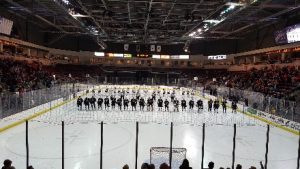 For those of us who love ice hockey, ’tis the season! As a fan of ice hockey and my work, it struck me that a hockey match is kind of like a public meeting that, if facilitated properly, can end up being a satisfying experience for most. Like many public meetings, participants are the opposing teams, spectators with varying levels of passion, coaches, and referees. Everyone has a job to do, and the goal (pardon the pun) is to do it as well as possible. See where I’m going?
For those of us who love ice hockey, ’tis the season! As a fan of ice hockey and my work, it struck me that a hockey match is kind of like a public meeting that, if facilitated properly, can end up being a satisfying experience for most. Like many public meetings, participants are the opposing teams, spectators with varying levels of passion, coaches, and referees. Everyone has a job to do, and the goal (pardon the pun) is to do it as well as possible. See where I’m going?
I submit that to have good facilitation skills means that facilitators need to be a combination of coach and referee. What winning approaches might they use?
Designing the Space: Just as a sports arena is the right setting for a sporting event, a public meeting space should be organized to make participants comfortable, make sure everyone can see the key players, and encourage attendees to talk with each other. This can often be a big challenge if event sponsors aren’t inclined to be flexible, but we must persist. Much depends on creating safe space. And even more depends on good cookies!
Suiting Up: It’s important to dress appropriately to the occasion. Usually, we say to aim for one step above the audience, but jeans and cowboy boots have been called for on many occasions, and only infrequently have we had to don protective equipment. The point is to know what to expect before you go, and to anticipate what will make participants feel safe and comfortable. This is the softer (and non-verbal) side of facilitation skills.
Locker Room Pep Talk: As facilitators, we need to set the stage for a successful meeting and focus everyone’s attention on the objectives, the rules of engagement, and the hoped-for outcomes. Before the games begin, explain the agenda, timing, and logistics and lay out ground rules for conduct and participation. To the extent possible, get participants to agree on etiquette; head-nodding will do.
Skating Around: Depending on the meeting format and the intensity of participants, there may be a lot of skating around, with everyone wanting a chance to make a point or beat the other guy. Well, this is their job and it’s why they showed up. Facilitators need to let this process unfold. And we need to try to use facilitation skills to give all participants a chance to play, if they want to. Don’t let a few dominate the whole game.
Fights: But we also need to know when to blow the whistle if someone commits an infraction. Some fights are just for show; we need to recognize these for the ‘political’ statements they are and let them go for a bit. However, some can get real – especially here in the Wild West where everyone is entitled to carry a weapon. If you expect trouble, organize some professional security presence! Participants’ safety is paramount so you can use all those facilitation skills you’ve learned.
The Penalty Box: It’s your job to enforce the rules of the meeting. This is a complex subject and a very difficult thing to accomplish successfully (probably why lots of project sponsors hire us to begin with, eh?). Unlike professional sports, public gatherings have no universally-recognized rules. This is one reason it’s important to gain support for specific operating procedures at the beginning of the meeting. If someone violates these agreements, you – or even better, the participants – can take them to task.
Scoring Goals: This is everybody’s objective, right? Put one in the net, get the crowd to cheer, and win the game. As a neutral facilitator, you won’t be cheering, but you should somehow acknowledge each person’s contribution in a way that validates their right to make their point. In a public hearing we held recently, my partner simply said, “Thank you, Mr. X” after each of the 75 speakers – it was perfect.
The Handshake: Of all the traditions in all the sports, the hockey handshake is, to me, the loveliest. No matter how hard-fought the battle, the combatants congratulate each other at the end on a game well-played. So, metaphorically speaking, if you as a facilitator can run a meeting so participants are willing to shake hands, you will be a true champion. And I’d hire you myself!
Author: Debra Duerr
